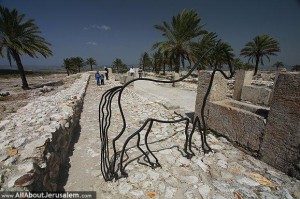Drasha given in Kinor David on Shabbat Ki Tisa / Parah, 20 Adar 5777, in memory of my father, whose Yahrzeit is 23 Adar
The Sin of the Golden Calf made it clear that despite all the miracles of the Exodus, of the Splitting of the Sea, and of the Revelation at Sinai, the Jewish People really did not understand G-d. They were too bound up in the pagan mindset of Egyptian culture, where every god had his own set of characteristics.
Therefore, Moshe asked G-d to describe Himself to him in terms of His characteristics, and G-d responded:
ה’, ה’, אל רחום וחנון, ארך אפיים רב חסד ואמת
Hashem, Hashem, G-d Who is merciful and gracious, patient, and has “great kindness and truth” (Shemot 34:6)
This expression, Rav Chessed ve’Emmet, which is usually translated as “great kindness and truth,” is actually quite hard to interpret. Rashi says that “Chessed” is when one is given more than one deserves, and “Emmet” is when one is given precisely what one deserves. He sees the two words as antonyms – Chessed vs Emmet.
As you know, I do a fair amount of translation, having translated all the Haftarot, and I must say that this interpretation does not work for most of the times that these words are used together in Tanach. For instance, the verse made famous by Yonatan Razael’s beautiful song:
קטונתי מכל החסדים ומכל האמת שעשית את עבדיך
“I am unworthy of all the kindnesses and all the truth that You have done for Your servant” (Bereishit 32:11)
It makes sense to say, “I am unworthy of all that you have given me beyond what I deserved,” but how does it make sense to say, “I am unworthy of all that you have given me that is precisely what I deserve?”
Moreover, what does it mean to have “great truth”? Truth is binary; something is either true, or not. But here we have “Rav Emmet,” a lot of truth. So there’s such a thing as only some truth, and a lot of truth? And sometimes, we can also have all the truth?
Dr. Amos Chacham, who wrote the Da’at Mikra commentary of Yeshayahu and Tehillim, points out that the word “Chessed” is not only used together with “Emmet,” it is also used together with “Brit” (covenant). For example:
לְעוֹלָם אֶשְׁמָר לוֹ חַסְדִּי וּבְרִיתִי נֶאֱמֶנֶת לוֹ
I will always keep for him My “Chessed”, and My “Brit” is faithful to him. (Tehillim 89)
It is very clear that the two parts of the verse are parallel; the words “Chessed” and “Brit” are synonyms, not antonyms. “Chessed” here is the fulfillment of promises. The three words, “Chessed,” “Emmet,” and “Brit” are variations on the same theme – the idea of keeping one’s word.
In English, we would translate “Chessed” as “loyalty,” “constancy,” “devotion.”
I’m not saying that “Chessed” isn’t kindness; the actions that result from it are indeed kind. However, Chessed does not come from feelings of compassion or benevolence; it comes from commitment.
And what, then, is “Rav Chessed?”
To help us understand the distinction between plain “Chessed,” and “Rav Chessed,” I will tell you a story about my father, z”l.
When my sister and I were growing up in America, we were a small family. Just parents and two children (although two children is already a big family for Russians 😉 ). With the exception of some very dear friends who were distantly related to us, all of our extended family was behind the Iron Curtain, and we were able to be in touch, with great difficulty, with only a handful of them.
Then our parents came to live in Israel, and it turned out that we had a whole bunch of second and third cousins, many times removed, who lived here. One of them was Aunt Donya, my father’s mother’s youngest first cousin, who was at the time in her early eighties, living in Ashdod. Needless to say, my father made an effort to make contact and visit her. That is “Chessed,” devotion – remembering connections and commitments, and strengthening them, despite the passage of time.
But my father did not stop there. He called Aunt Donya every single week, every Tuesday, for ten years. In fact, she was one of the first people to find out that he had passed away, because it was Tuesday, and he hadn’t called.
That is “Rav Chessed” – great devotion; unfailing commitment.
Emmet must also be understood from that perspective. It is not binary truth, true or false; it is truth over time, that is, keeping one’s word. The blessings of the Haftarah are phrased in those terms:
הָאֵל הַנֶּאֱמָן, הָאוֹמֵר וְעוֹשֶׂה, הַמְדַבֵּר וּמְקַיֵּם,שֶׁכָּל דְּבָרָיו אֱמֶת וָצֶדֶק
“The faithful G-d, Who says and then does, Who speaks and then fulfills, all of Whose words are truth and justice. “
How do we know if prophecy is true? When it is fulfilled. So when the prophet Yechezkel says in the Haftarah:
וְלָקַחְתִּי אֶתְכֶם מִן הַגּוֹיִם וְקִבַּצְתִּי אֶתְכֶם מִכָּל הָאֲרָצוֹת וְהֵבֵאתִי אֶתְכֶם אֶל אַדְמַתְכֶם
I will take you from the nations, and I will gather you from all the lands, and I will bring you to your land. (Yechezkel 36:24)
We look around us, and we see that these words have been fulfilled. How lucky are we, our generation, to be able to say that?
So now we know that “Rav Chessed ve’Emmet” means that G-d keeps His word despite the passage of time, with great commitment and devotion.
This is important because in the pagan mindset, this is not at all obvious. In the pantheons of many cultures around the world, there is a god who is described as a “trickster” – Loki – a god whose main characteristic is his unpredictability; not only can he not be trusted, he goes out of his way to wreak havoc. There is something in the human psyche that makes us want a god like that, perhaps to explain the chaos in the world around us.
This has even affected Jewish culture: there is an expression in Yiddish: “Der mensch trakht un gott lacht,” “man plans and G-d laughs.” But for us, it is not coming from the same place. It is not that we think that G-d enjoys it when our plans go awry, and that He’s doing it out of some perverse pleasure in our pain. It is that we realize that His plans are greater than ours, and that we are limited human beings who can only do so much.
As we say on Yom Kippur:
מה אנו מה חיינו מה חסדנו מה כוחנו
“What are we? What are our lives? What are our commitments? What is our strength?”
But Hashem, our G-d, He is Rav Chessed ve’Emmet – He speaks and He fulfills His word.
Now, to explain “Rav Emmet.” The Haftarah helps us here as well:
וְהוֹשַׁבְתִּי אֶת הֶעָרִים וְנִבְנוּ הֶחֳרָבוֹת
I will cause the cities to be settled, the ruins rebuilt (Yechezkel 36:33)
G-d words of Emmet would have been fulfilled if Yerushalayim had been rebuilt within its original boundaries. But that is not what we see. We see hill after hill covered in buildings, miles of them. Hundreds of thousands of people.
G-d promised:
וְהָאָרֶץ הַנְּשַׁמָּה תֵּעָבֵד
This abandoned land will be tilled (36:34)
His words of Emmet would have been fulfilled if the land were simply supporting its population. But we export cut flowers to Holland, and tropical fruit to Italy.
This is what Yaakov Avinu meant when he said, “I am not deserving of all the Emmet that You have done for Your servant – for I crossed the Jordan River with just my walking stick, and now I have grown to two full camps.”
G-d had promised him that He would take care of him. And He did, through very trying times. That promise would have been fulfilled if he had just gotten back safely. When Yaakov looks around at what he was given, he is overwhelmed by the quantity of Emmet, of fulfillment.
We also look around, and we are also overwhelmed by the quantity of Emmet.
Because that is our G-d, Hashem, Who says and then does, Who speaks and then fulfils. G-d Whose characteristics are Rav Chessed ve’Emmet.
Unfailing devotion, and eternal, overwhelming commitment.
Copyright © Kira Sirote
In memory of my parents, Peter & Nella Rozenberg, z”l
לעילוי נשמת אבי מורי פנחס בן נתן נטע ואמי מורתי חנה בת זעליג ז”ל



